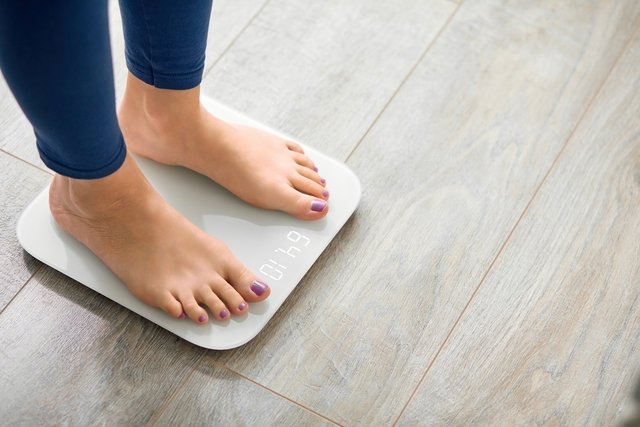To know how many kilos you should lose, it is important to know what is the ideal weight to reach according to each person’s height and age, which is calculated using the body mass index, or BMI.
The recommended healthy weight loss is between 0.5 and 1 kg per week, which means losing 2 to 4 kg per month. Thus, a person who needs to lose 8 kg to reach the appropriate BMI will take around 2 months to lose weight, for example.
Some tips that help you lose weight include intermittent fasting, practicing physical activity regularly, avoiding ultra-processed foods and consuming some thermogenic foods, such as green tea, cinnamon, pepper and ginger.

How many kilos do I need to lose
To know how many kilos you need to lose, you must know the ideal weight according to each person’s height and age, which is obtained by calculating the body mass index, or BMI.
To find out how many kilos you need to lose, enter your data into the calculator below:
Ideal weight is an estimate of how much a person should weigh based on their height. However, there are other factors that must also be taken into consideration, such as the percentage of fat, muscle and water in the body, to better determine the ideal weight.
If you have any doubts about your ideal weight, it is advisable to consult a nutritionist to carry out a complete body assessment.
5 tips for losing weight
Some simple tips that help you lose weight are:
1. Do intermittent fasting
Intermittent fasting is a type of diet in which prolonged fasting periods vary between 16 and 24 hours.
This diet helps you lose weight, because it reduces levels of the hormone insulin in the blood and stimulates the body to use sugar reserves and fat cells, favoring weight loss. Learn more about intermittent fasting.
2. Exercise regularly
Exercising regularly, at least 3 times a week, helps you lose weight, because it increases muscle mass and accelerates metabolism, stimulating the burning of body fat and weight loss.
Physical exercise should be of moderate to high intensity and should include aerobic activities, such as dancing, running and swimming, and resistance activities, such as weight training and calisthenics. See other exercises that help you lose weight.
3. Drink plenty of water
Drinking plenty of water during the day helps you lose weight, because this drink takes up space in the stomach, prolonging satiety and reducing the desire to eat.
The recommended amount of water per day is between 1.5 and 3 liters per day, varying according to weight, age and physical activity, for example. Find out how many liters of water are recommended for each person.
4. Eat thermogenic foods
Thermogenic foods, such as cinnamon, ginger, pepper and coffee, help with weight loss, because they contain capsaicin, cinnamaldehyde, gingerol and caffeine, bioactive compounds that promote the burning of body fat. See a list of thermogenic foods.
5. Avoid ultra-processed foods
To lose weight, it is important to avoid ultra-processed foods, such as ice cream, soda, ready-made sauces and seasonings, and fast food-type meals. Discover other ultra-processed foods.
This is because ultra-processed foods are generally rich in fat and sugar, calorie-rich nutrients that, when consumed in excess, are stored in the form of fat, favoring weight gain.
Why is it important to lose weight
Losing weight is important in cases of excess weight, because excess body fat increases the risk of developing diseases such as obesity, type 2 diabetes, high blood pressure, cancer and heart attack, for example.
Furthermore, being overweight can also cause problems such as infertility, impotence, body aches, difficulties in physical exertion, sleep apnea, and poor circulation in the legs.
See nutritionist Tatiana Zanin for other tips for losing weight:

Sign up for our newsletter and stay up to date with exclusive news
that can transform your routine!
Warning: Undefined array key "title" in /home/storelat/public_html/wp-content/plugins/link-whisper-premium/templates/frontend/related-posts.php on line 12
Warning: Undefined array key "title_tag" in /home/storelat/public_html/wp-content/plugins/link-whisper-premium/templates/frontend/related-posts.php on line 13



